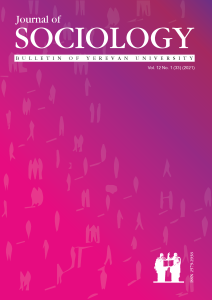Transforming the 2019-2020 Protest Agenda on Social Network Sites
DOI:
https://doi.org/10.46991/BYSU:F/2021.12.1.003Keywords:
social networks, protest activity, transformation, agenda, inclusionAbstract
Social network sites have taken a strong position in the space of socio-political communication. In the modern world, the necessity to analyze events occurring in the virtual space for a relevant reaction to events occurring in reality, is generally recognized. The study of online processes is largely based on the analysis of quantitative data that allows talking about the activity of users and their involvement. However, the meaning of the information transmitted in social networks remains important. In the framework of this study, an attempt is made to determine the specifics of broadcasting protest agendas in social networks and the impact of their transformation on the process of involving users in online protest activity. Examples of 7 protest campaigns accompanied by active coverage in social networks are given. Conclusions are drawn about the specifics of broadcasting protest agendas in social networks and supporting users from their transformation.
References
Kuzin, O.Yu. (2010). Vovlechennost' v politicheskii process kak element demokraticheskogograjdanstva. Izvestiya TulGU. Gumanitarnye nauki. N2, 251-258
Ushkin, S.G. (2014). Vovlechennost' pol'zovatelei social'nykh setei v protestnoe dvijenie. Vlast', No 8, 138-142
Lavrikova, A.A. (2015). Dinamika pokazatelei politicheskoi vovlechennosti grajdan v sovremennom rossiiskom obshchestve. Izvestiya TulGU. Gumanitarnye nauki. No3, 9-19
Rykov, Yu.G. (2013). Vyrtual'noe soobshchestvo kak social'noe pole: neravenstvo i kammunikativnyi kapital. Jurnal Sociologii i social'noi antropologii t. 16, no4, 44-60
Televnoi, A.D. & Khlopotov, M.V. (2018). Issledovanie tematicheskikh profilei i sposobov rascheta vovlechennosti auditorii v sobshchestvakh social'noi seti "Vkontakte". Vestnik evraziiskoi nauki. t. 10, No2, 71
Pisarevskiy, V. G. (2020). Methodology of big data in studying orthodox communities Research Result. Sociology and Management, 6, No 1, 16-28. Doi: https://doi.org/10.18413/2408-9338-2020-6-1-0-2
Barabash, N.S. & Jukov, D.S. (2019). Ocenka urovnya vovlechennosti pol'zovatelei v radikal'nye gruppy v social'nykh setyakh. Innovatika i ekspertiza: nauchnye trudy, No 3 (28), 113-122. Doi: https://doi.org/10.35264/1996-2274-2019-3-113-122
Downloads
Published
How to Cite
Issue
Section
License
Copyright (c) 2021 Alexey Belyakov, Alexander Sokolov, Svetlana Mironova, Alexander Frolov, Elena Isaeva

This work is licensed under a Creative Commons Attribution-NonCommercial 4.0 International License.








